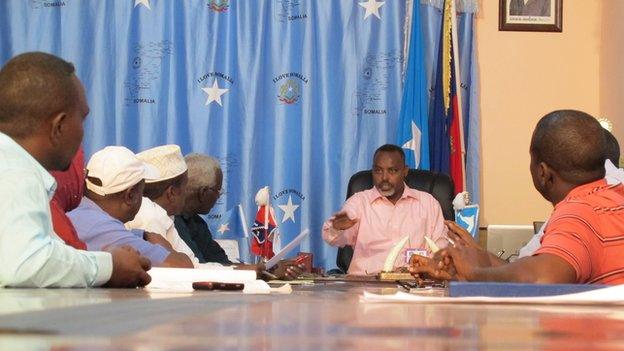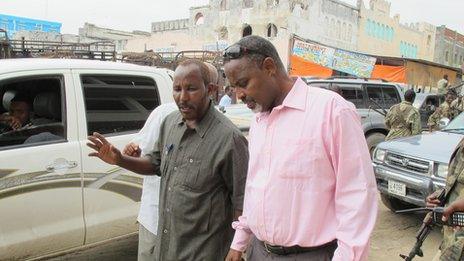Meeting the mayor of Mogadishu: Somalia's Tarzan
- Published

The Mayor of Mogadishu Mohamed Nur chairs a meeting in the city's new Chamber of Commerce
In a cluttered office in the centre of Mogadishu, a dozen men in suits squeeze round a table to haggle politely over the price of business licenses. An elderly air conditioner wheezes quietly in the background.
In a ruined city famous for its warlords and anarchy, this modest, humdrum meeting of Mogadishu's new Chamber of Commerce feels like a milestone - proof that Somalia's capital is slowly returning to a loose approximation of normality after two decades of spectacular self-destruction.
But is this progress irreversible? Or is Somalia destined to slide back into clan warfare and chaos? And can a man called Tarzan make a difference?
At the head of the long table, sporting a bright pink shirt and neatly cropped grey goatee, sits Mohamed Nur, the mayor of Mogadishu - known to all by his childhood nickname, Tarzan.
It is two years since I first met Tarzan, soon after his return from years in exile in London. He was one of several prominent members of the diaspora to come home to join a fragile transitional government.
Perhaps "fragile" is not a strong enough word.
Back in 2010, half of Mogadishu was still under the control of the al-Qaeda affiliated Islamist group al-Shabab, a deafeningly active front-line split the city in two, and Tarzan and his colleagues were huddled under mortar fire in the fortified presidential palace, surrounded by foreign peacekeepers, and trying rather lamely to exude an air of confidence.
Today Mogadishu remains a dangerously unpredictable city. But Tarzan's confidence finally seems justified - or at least understandable.
Rebuilding Mogadishu
Al-Shabab has been pushed out of Mogadishu, a new constitution and new president are in place, and the mayor now races round the city like a small tornado, organising the renovation of shopping malls, street lighting, rubbish collection, and arguing constantly with soldiers, warlords, politicians and anyone else he suspects of trying to thwart him.
"There was nothing here. Not a single broom. Not a single wheelbarrow. No paper work. No trace," says Tarzan, of the regional administration he warily agreed to take over two years ago, half suspecting his enemies had offered the job as a poisoned chalice.
"The city was dark. No money. And lots of gunfire."

A businessman seizes the opportunity to speak to the mayor, who cannot walk the streets of Mogadishu for long due to persistent death threats from al-Shabab
Now, Tarzan's optimism is tempered only by a sense that time may not be on his, or Somalia's new government's side.
"A government cannot be a government if they cannot provide services. Time is running out. We have to do something to build the confidence of the people otherwise they will give up.
"The day they say: 'What's the difference between the government and Shabab?' we are dead," he tells me as we drive through the unrecognisable, battle-scarred neighbourhood where he grew up in a state orphanage.
The mayor's wife, Shamis, initially stayed with their grown-up children in Camden, London.
"I did not contact her for the first five months. I did not want to worry her," he says with a logic that probably does not withstand closer examination.
But now Shamis visits for long stretches, living with her husband in a small bungalow on a heavily guarded cul-de-sac in the city centre.
"I was angry. I didn't want him to come here and leave his family. But now I am very proud of him. And not only me," she says.
"He is stubborn - a very strict, very straight man. A lot of people like him for what he's doing. But a lot hate him because they are not getting what they want," Shamis tells me over dinner one evening.
That hatred still carries with it considerable risks in a clan-riven society which Shamis describes as "traumatised - people are in a coma", after so many years of suffering and violence.
Tarzan himself has been accused of corruption, murder, and even "extremism".
Driving through the increasingly traffic-clogged streets of Mogadishu in the mayor's armoured convoy - his cousin takes care of his security, with pick-ups packed with his own heavily armed private militia in front and behind - can be an unsettling experience.
Al-Shabab continues to send Tarzan death threats by phone and text. Last year his car was blown up shortly after he had got out of it.
"I will die one day, and no-one can advance or delay it, so I don't worry much," he says dryly. The phrase has become something of a mantra for him.
Tarzan is one of many Somalis from the diaspora lured home by a conviction that their country's fortunes are finally changing.
Ahmed Jama came back to Mogadishu from the English city of Birmingham shortly before Tarzan and proudly shows me his expanding restaurant empire in the city.
"Everyone should come back. We are here to change the mentality," he says with a fervent optimism.
A few weeks later, two of his restaurants were targeted in two separate suicide attacks that left some 17 people, including members of his staff, dead.
By phone, a shaken Mr Jama spoke of his shock at seeing "meat, arms, legs, lying on the ground", but still assured me that his resolve was undiminished - that the risks remained worth taking.
Late one afternoon, the mayor's convoy takes us to the edge of the city, where al-Shabab retains a lingering presence, and where Tarzan is embroiled in yet another murky confrontation - this time with soldiers from the Somali National Army over a disputed checkpoint where taxes are collected from vehicles leaving Mogadishu.
"Corruption, corruption. From the tip to the teeth," says Tarzan vehemently.
The mayor and several generals sit down to discuss their differences: "They put up illegal checkpoints. I don't keep silent. I complain and criticise," says the mayor after reaching a deal.
But he still suspects the army was trying to deceive him: "Soldiers without discipline are not soldiers."
A few minutes later - just after we had left the mayor and driven away in a separate car - a roadside bomb exploded close to where Tarzan and some army vehicles were passing. Six soldiers were killed, and several injured.
Tarzan blamed al-Shabab.
"We were lucky. A roadside bomb. Very dangerous."
Then, with the smallest of shrugs, he turns back to his desk, and the next item on the mayor's agenda.
Andrew Harding presents Crossing Continents on BBC Radio 4 on Thursday, 15 November at 11:00 GMT and Monday, 19 November at 20:30 GMT. Listen again via the Radio 4 website or download the Crossing Continents podcast.